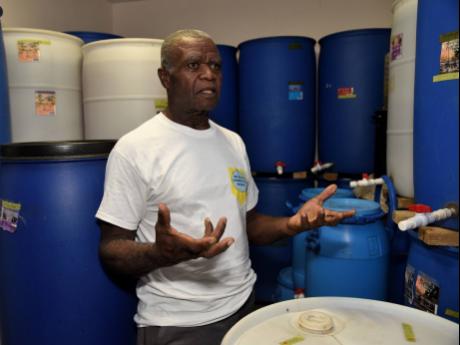Winemaker Butla’s marks 10 years despite elusive profit
Winston Butler admits that his small enterprise making and selling wines from a wide range of fermented fruits, vegetables and tropical plants is not yet turning a profit 10 years into the business, which is run out of his home in Mandeville, Manchester.
In fact, the venture, which is estimated to have required $2 million in start-up capital from savings, is subsidised by Butler’s farming activities and occasionally by remittances from his two grown children, who live overseas.
Still, the entrepreneur believes that Butla’s Tropical Wines can be brought to profitability and scaled up if only he could get the marketing and distribution right to push sales.
Since the 1980s, Butler, 67, who once worked as a pressman and driver with the defunct Daily News newspaper, then worked as a travelling salesman for a food company after the paper closed, has planted yams, sorrel and other cash crops in the Croft’s Hill and Kellits areas of Clarendon and sells the produce to realise a steady income.
Over many years since relocating from Kingston to Mandeville in the mid-1980s, he experimented with winemaking, and since 2010, Butler says, has been developing it as a business, having acted on the feedback of persons who tasted his wine formulations and encouraged him to “run with it”.
The first wine he produced commercially was from sorrel. He says wine from various plants has to be appreciated for its strong fermented taste, which will be different to fresh juice from the same plants. In the past 10 years he has produced 15 wine flavours which have been tested and certified by the Bureau of Standards Jamaica, SBJ. Five more are said to be in the developmental stage.
The small entrepreneur told the Financial Gleaner in an interview at his home, where a fermenting room was specially built and equipped, that the selection of materials for making new wine flavours is determined by inspiration and his research into their potential health benefits.
“I may be sitting eating and an idea comes to mind to use a particular thing to make wine, and I usually get very excited to see how it will turn out,” Butler says.
No scientific tests done
Microbiology testing to prove or disprove anecdotal health benefits have not yet been done, so Butler is prohibited from using such information in his marketing and labelling. He cites the costs of such scientific tests as being prohibitive at this time.
The fruit, vegetable and plant materials now used to make Butla’s wines include hemp, cerasee, pimento, apple, June plum, black currant, lemon grass, moringa, guinea hen weed, mango, beetroot, and turmeric.
Wines from sugar cane, carrot, coffee and pineapple are now being developed for BSJ testing and then commercialisation.
The best-sellers are said to be wines from hemp and guinea hen weed, both of which are reputed to have medicinal properties. The alcohol content of the naturally fermented wines ranges between five and 14 per cent.
Butla’s Tropical Wines, sold in 150-millilitre and 170-millilitre bottles, have secured shelf space at Sampars wholesale supermarket in Kingston, and Fontana Pharmacy outlets nationwide, among other shops. A St Andrew-based flower shop utilises the products in its gift sets.
Getting into new distribution outlets has been a challenge, according to Butler. The products are said to have a loyal clientele locally and among visiting Jamaicans in the diaspora.
Butler says the Tourism Linkages Network of the Tourism Enhancement Fund, TEF, has been useful in providing promotional opportunities for the products, including at the annual ‘Christmas in July’ exhibition, which is a partnership involving the TEF, Jamaica Business Development Corporation, Jamaica Promotions Corporation, and the Jamaica Hotel and Tourist Association.
Product sales are described as slow, except at these promotions and those done from time to time by Butler, who runs a one-man operation – from purchasing inputs, or growing much of them on his farm at Lemon Hall in Lluidas Vale in St Catherine, to the fermenting of the wines, bottling, packaging and distribution.
Sluggish sales are also related, he concedes, to the absence of a website, which is on the list of things to get done.
Having reinvested revenues into the business, the entrepreneur says he still takes no salary and has no rental expense, but revenues cover his maintenance and licensing costs for a panel van he uses for deliveries. The high cost and uncertain supply of imported bottles is also a challenge to the venture.
Butler was unable to give an estimate of total investment in the business over the 10 years but says he has started the process of collating that information from his records.
As for the future, he is not averse to selling the business, saying he is being prevailed upon by his wife and children to pack it in and join them in the United States. However, Butler, who has resisted migration for years, says he has unfinished business regarding the turnaround of the enterprise, which he hopes to set on a profitable path, whether with himself or someone else at the helm.

